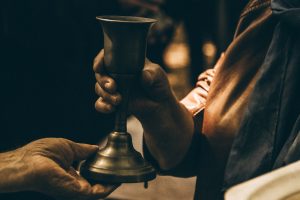- Why is Holy Thursday sometimes referred to as Maundy Thursday?
The word “Maundy” is derived from the Latin word mandatum, or “mandate.”
“A new commandment I give unto you, That ye love one another; as I have loved you.” (John 13:34)
2. What happens on this day?
- Usually, the bishop celebrates a “Chrism Mass” with his priests.
- The Mass of the Lord’s Supper is held in the evening.
- At the Mass of the Lord’s Supper, the priest (often) performs the washing of feet.
- The Tabernacle is empty and the Eucharist is put in a place of repose.
- The altar is stripped.
- The faithful are invited to spend time in Eucharistic adoration while the Sacrament is in repose.

3. Why is the Lord’s supper important?
According to the Catechism of the Catholic Church 1323 “At the Last Supper, on the night he was betrayed, our Savior instituted the Eucharistic sacrifice of his Body and Blood. This he did in order to perpetuate the sacrifice of the cross throughout the ages until he should come again, and so to entrust to his beloved Spouse, the Church, a memorial of his death and resurrection: a sacrament of love, a sign of unity, a bond of charity, a Paschal banquet ‘in which Christ is consumed, the mind is filled with grace, and a pledge of future glory is given to us.'”
4. Why the washing of the feet and what does it symbolise?
“During supper, fully aware that the Father had put everything into his power and that he had come from God and was returning to God, he rose from supper and took off his outer garments. He took a towel and tied it around his waist. Then he poured water into a basin and began to wash the disciples’ feet and dry them with the towel around his waist. He came to Simon Peter, who said to him, “Master, are you going to wash my feet?” Jesus answered and said to him, “What I am doing, you do not understand now, but you will understand later.” Peter said to him, “You will never wash my feet.” Jesus answered him, “Unless I wash you, you will have no inheritance with me.” Simon Peter said to him, “Master, then not only my feet, but my hands and head as well.” (John 13:2–9)
The washing of guests’ feet was a task normally done only by a slave. What Jesus is giving to the Apostles is the example of service without limits. The Son of God, who had already humbled Himself to take the form of a man also takes the form of a slave (Phil 2:7). He would humble Himself even further by dying on the cross for us. He tells the Apostles, if they do not humbly serve others as He serves them, they can have no part (no share) with Him.
5. What happens to the decoration of the Church at this time?
After Mass the altar should be stripped.
It is fitting that any crosses in the church be covered with a red or purple veil, unless they have already been veiled on the Saturday before the Fifth Sunday of Lent.
Lamps should not be lit before the images of saints.


